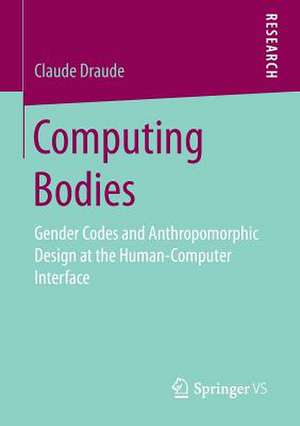Computing Bodies: Gender Codes and Anthropomorphic Design at the Human-Computer Interface
Autor Claude Draudeen Limba Engleză Paperback – 21 iun 2017
Preț: 448.21 lei
Nou
Puncte Express: 672
Preț estimativ în valută:
85.76€ • 89.55$ • 70.82£
85.76€ • 89.55$ • 70.82£
Carte tipărită la comandă
Livrare economică 15-29 aprilie
Preluare comenzi: 021 569.72.76
Specificații
ISBN-13: 9783658186593
ISBN-10: 3658186593
Pagini: 209
Ilustrații: IX, 210 p. 35 illus.
Dimensiuni: 148 x 210 mm
Greutate: 0.27 kg
Ediția:1st ed. 2017
Editura: Springer Fachmedien Wiesbaden
Colecția Springer VS
Locul publicării:Wiesbaden, Germany
ISBN-10: 3658186593
Pagini: 209
Ilustrații: IX, 210 p. 35 illus.
Dimensiuni: 148 x 210 mm
Greutate: 0.27 kg
Ediția:1st ed. 2017
Editura: Springer Fachmedien Wiesbaden
Colecția Springer VS
Locul publicării:Wiesbaden, Germany
Cuprins
The Human-Computer Interface.- Semiotic Mirrors: The Interface as a Place of Sign/Signal Mediating.- Embodiment: The Role of the Body, Gaze Behavior and Emotions.- Counting as Machine, Counting as Human.
Notă biografică
Prof. Dr. Claude Draude is head of the department for Gender/Diversity in Informatics Systems (GeDIS) at the Faculty of Electrical Engineering/Computing at the University of Kassel, Germany.
Textul de pe ultima copertă
Claude Draude analyzes embodied software agents – interface solutions that are designed to talk back and give emotional feedback – from a gender and media studies perspective. She addresses technological and sociocultural concepts in their interplay of shifting the boundary between what is considered as human and what as machine. The author discusses the technological realization of specific personality models that define the design of embodied software agents – emotion and gaze models, in particular. Finally, she explores these models in their broader cultural context by relating them to the prominent topic of the Turing test and the notion of the Uncanny Valley.
Contents
- The Human-Computer Interface
- Semiotic Mirrors:The Interface as a Place of Sign/Signal Mediating
- Embodiment: The Role of the Body, Gaze Behavior and Emotions
- Counting as Machine, Counting as Human
Target Groups
- Researchers and students in the fields of media studies, computer science, cultural studies, gender studies, sociology
The Author
Prof. Dr. Claude Draude is head of the department for Gender/Diversity in Informatics Systems (GeDIS) at the Faculty of Electrical Engineering/Computing at the University of Kassel, Germany.
Caracteristici
Cross-disciplinary analysis between computing, gender studies, and new media studies Includes supplementary material: sn.pub/extras
